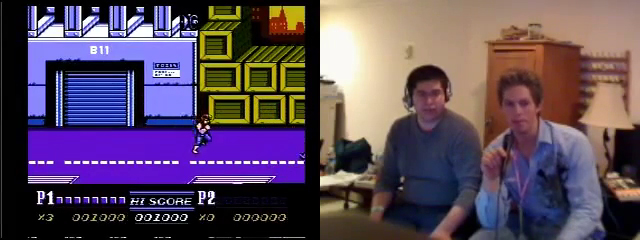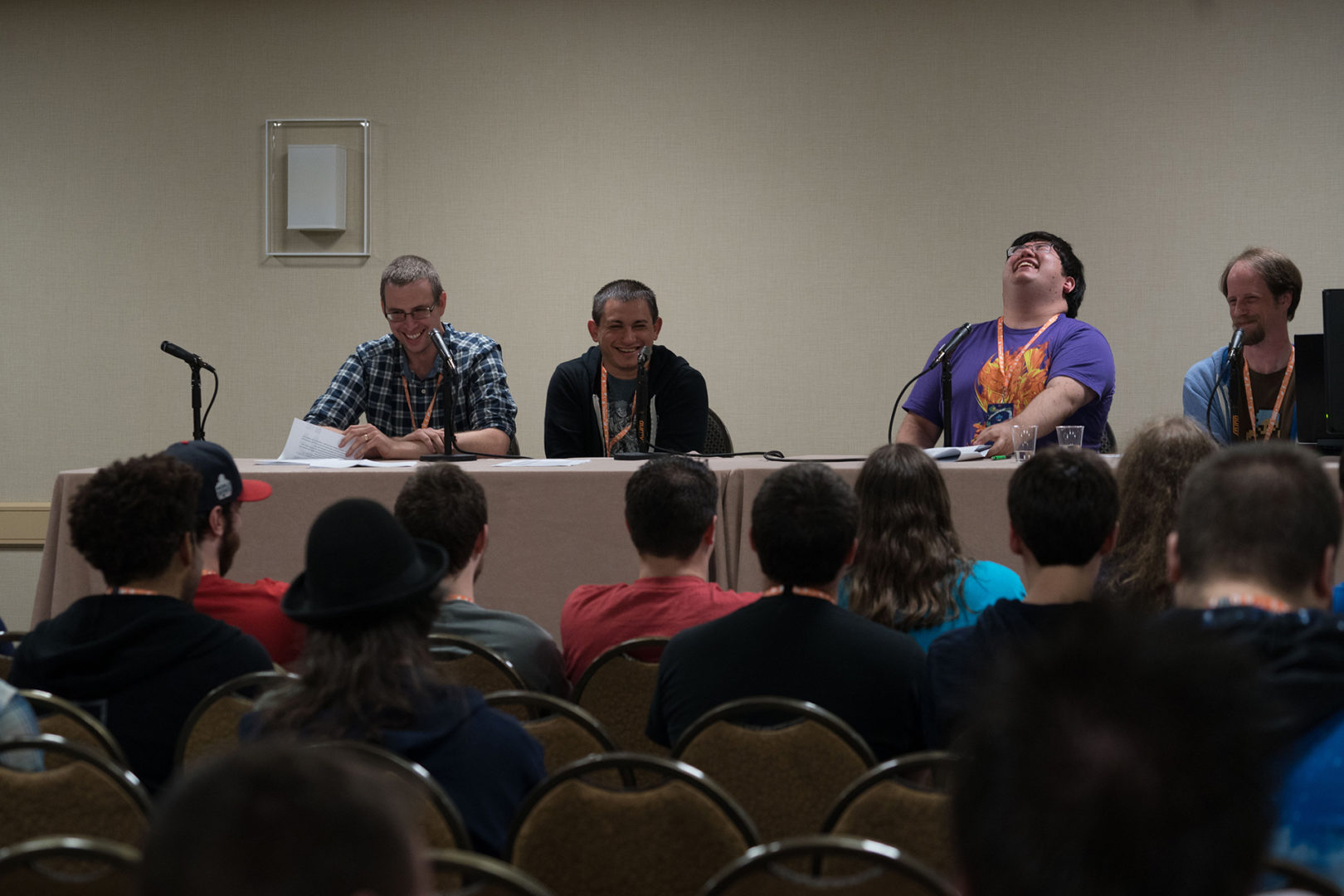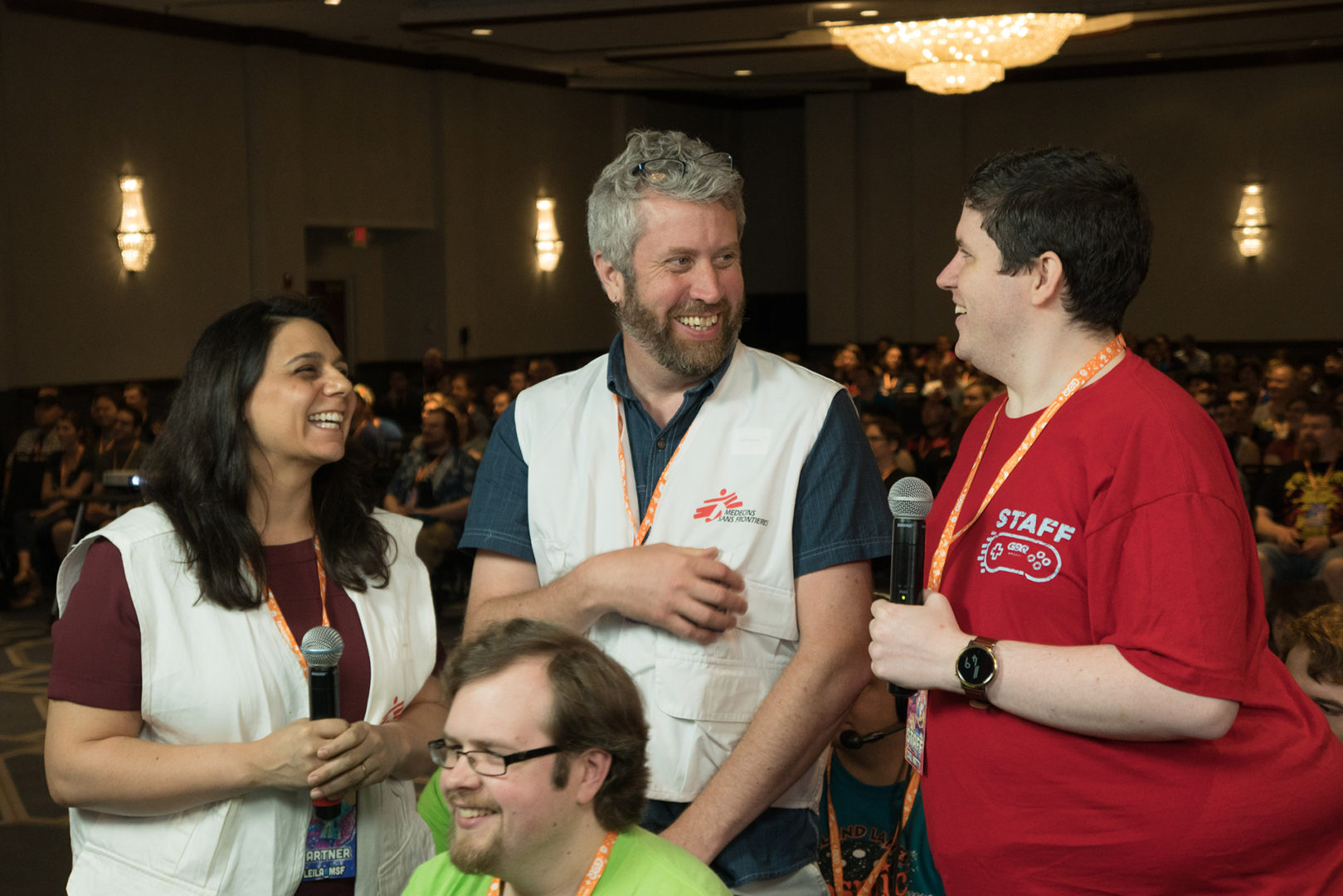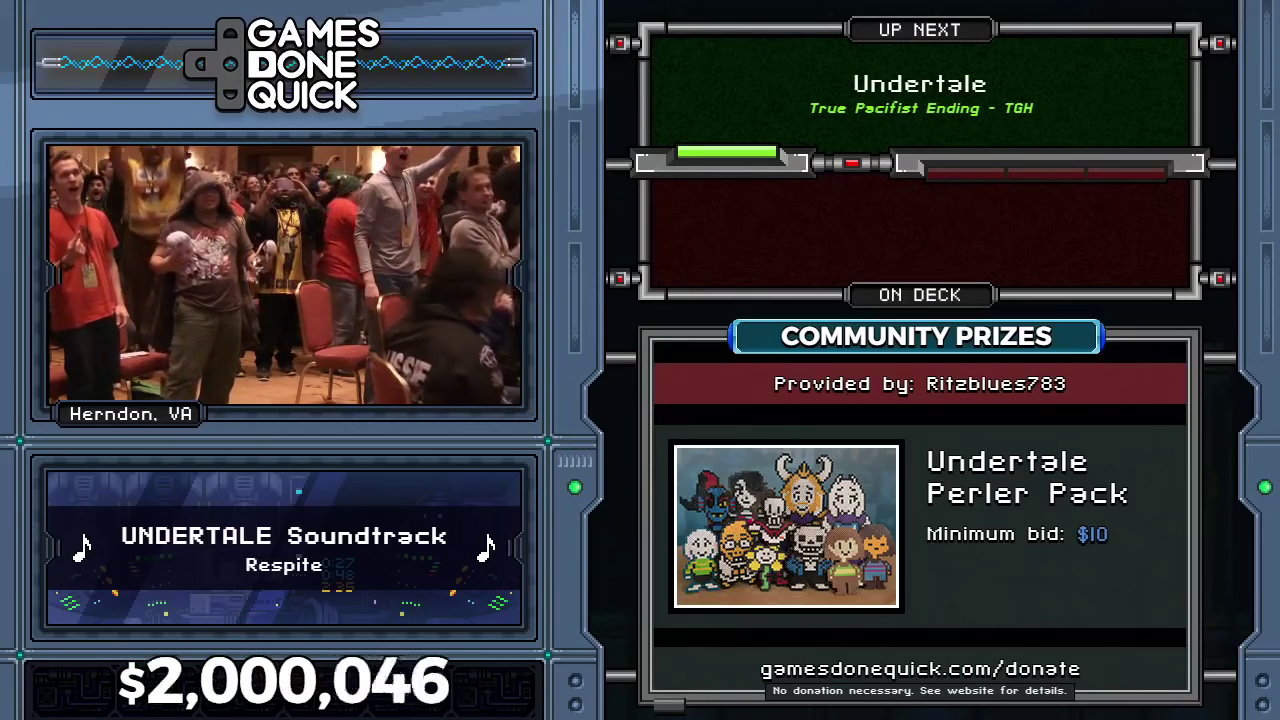Over a week in January, Awesome Games Done Quick streamed live from the Marriott Hotel in Rockville, Maryland. Hundreds of attendees showed up each day for the event, equalling thousands of participants over the week-long event. More than 200,000 more tuned into the Twitch stream to watch along from their homes.
Overlaid over a speedrun of the likes of Super Mario Odyssey and Luigi’s Mansion, a counter is ticking up, not down—$1.3 million, $1.4 million. And it doesn’t stop until it reaches more than $2.4 million. For the past nine years, speedrunners have assembled each year, sometimes multiple times a year, to raise money for charity. The speed at which Games Done Quick has grown from its 2010 beginning is impressive; each year, the event seems to double in size. At its start, Games Done Quick was a group of 20 friends in founder Mike Uyama’s mother’s basement.
“We were supposed to have Classic Games Done Quick, the first [Games Done Quick] at MAGFest back in 2010, but they couldn’t provide internet with a decent upload,” Uyama told EGM. “We had to use the option with decent internet—my mother’s house that was roughly a 10-minute drive away from the venue.”
It was a time before Twitch, and the early days of Justin.tv, too. “[Justin.tv] booted viewers outside of the U.S. if a stream had more than 1,000 viewers because they didn’t have good overseas servers,” Uyama said. “This drawback is why we used Ustream for our first couple events.”

Credit: Still taken from Speed Demos Archive YouTube channel
The stream, called Classic Games Done Quick back then, flicked on to the Mega Man title screen for its first run. There’s no commentary—plain white text denotes this on the right side of the screen opposite a small box playing Mega Man. It’s not until the fourth run, Double Dragon II: The Revenge, where we hear from the participants at the event.
Speedrunning is the practice of playing video games really fast. Sometimes, this means exploiting glitches or bugs to progress faster than normal through the game. Other times, this means is completing actions perfectly—making no mistakes—to get a quick time. People have been speedrunning video games for a long time, a way to demonstrate mastery over a game and play it in a new way. Most games can be speedrun, but the first event from Games Done Quick was focused purely on classic games, hence the name. “There’s a certain satisfaction barrelling through a game that’s commonly touted as being insanely hard,” Chip “Breakdown” Vogel, who’s been involved in Games Done Quick since the beginning, told EGM.
Uyama said the idea to stream a charity-based speedrunning event came from two events that did a similar thing: SpeedGamers and Desert Bus for Hope. “The main speedrunning community at the time, Speed Demos Archive, was inspired by these streams and numerous members wanted to host a speedrunning charity stream,” Uyama said. “Being the main admin at SDA, I decided the event should focus on retro games because that was our strongest suit.”

Image courtesy Games Done Quick
But what could have been a devastating turn-of-events for Classic Games Done Quick—a lack of quality internet at the original location at MAGFest—was actually part of its draw.
“It’s worth noting that CGDQ being in my mom’s basement was a boon because it provided a more intimate, hands-on atmosphere for the stream,” Uyuma said. “And MAGFast would have been way too loud with all the arcade machines and attendees.”
Vogel added: “At the earlier events, you would interact with literally everybody there, and that led to a sense of camaraderie around the entire event that you can’t replicate in the current scope. Growth certainly has its advantages, but just how tight-knit the first few events felt is something I will always remember.”
Classic Games Done Quick streamed non-stop for around 50 hours, and in that time, brought in $10,532 for a charity called CARE.
In 2011, the Games Done Quick crew expanded the event into all types of games—hence the name change from “Classic” to “Awesome.” The event moved out of Uyuma’s mom’s basement, too, and into the National 4-H Youth Center in Chevy Chase, Maryland, now raising money for the Prevent Cancer Foundation, which it’s continued to support. Games Done Quick director of operations Matt Merkle said the Prevent Cancer Foundation was crucial to the early growth of the event. “They were willing to put the money into the event on the assumption that they would get much more money back,” Merkle told EGM. “After a couple years, we were able to start putting our own money into it instead of relying on the charity for equipment and logistics.”
Merkle said the event has been growing rapidly from there—enough that Games Done Quick has to control the growth. “We could probably be much larger in terms of attendance right now, but we want to make sure the growth doesn’t outpace what we’re prepared to handle,” he said. “We’re very careful in terms of how much we allow it to grow every year.”

Image courtesy Games Done Quick
In 2011, 2012, and 2013, Awesome Games Done Quick remained in the 4-H Center, before it moved into Crowne Plaza Dulles in Virginia.
“The biggest change was really learning how to grow, plan, and schedule a longer marathon,” Uyuma said. “[Classic Games Done Quick] was only a bit over 50 hours—maybe 54—but [Awesome Games Done Quick] was over 100. There were definitely some growing pains. The first [Awesome Games Done Quick] ended around 15 hours behind schedule.”
In 2015, the event moved into the Hilton and kept growing in size, and equipment evolved. You can start to see an improvement in stream quality around this time, Merkle said. New equipment, too, helped the event up its overall production value from its humble basement beginnings. As the event went on, scheduling started to feel more natural. “One of the biggest things we did wasn’t necessarily equipment, but investment into the layouts,” he added. “For a long time, we just had a static image or no image at all—just text on the screen in addition to the camera and video.”
But with growth came challenges: Games Done Quick has faced a few controversies as the event grows. The company’s grappled with behavior both in real-life at the events and online—including at the 2017 Awesome Games Done Quick, when a confusing stream of events occurred that reportedly included a speedrunner banned for wearing a “Make America Great Again” hat (politics are against the rules), then unbanned after determining he wasn’t wearing the hat, and reportedly banned again for unplugging equipment, according to a Kotaku report from the time. A different speedrunner was also banned for wearing the the MAGA hat. Critics of the bans called the rules inconsistent, despite the policies being available online.

Credit: Still taken from Games Done Quick YouTube channel
The next year, at the 2018 event, Games Done Quick drew ire again after setting its Twitch chat to “subscribers-only” as a way to moderate what can often be an unmanageable mess. “We take moderation seriously and want to maintain a positive atmosphere in all of our events, especially as we are representing the charities we are benefiting,” Games Done Quick said in a statement to Polygon. “As Games Done Quick has grown over the years, our channel has now been averaging between 100,000 to 150,000 concurrent viewers, and moderating a channel of this size has been extremely difficult.”
Any money made from the subscriptions was donated to the Prevent Cancer Foundation as part of the drive. But some viewers were upset that they had to pay the $5 subscription fee—rather than choose to donate that money on their own—if they wanted to participate in the chat.
It’s the growth, despite the problems, that helped Games Done Quick break $2 million raised for the Prevent Cancer Foundation at its 2017 event.
“The energy in the room during the lead-up to [reaching $2 million] was unreal, and donations were coming in fast enough that we were counting down the last $10,000 or so like it was New Year’s Eve,” Vogel said.
The crowd on its feet, the entire room—hundreds of people—erupted in cheers as the counter hit $2 million, and they didn’t stop cheering for nearly a minute after. On Twitch, where more than 200,000 viewers were watching, the chat spammed PogChamp, a symbol of shock and excitement. For the first time in seven years since the event’s inception, Awesome Games Done Quick broke $2 million donations, ending the week at $2.2 million, a total that was almost double the 2016 event. Subsequent streams may have improved on those numbers—in July, the spin-off Summer Games Done Quick 2019 raised more than $3 million for Doctors Without Borders—but that 2017 stream remains an important milestone in the history of the event.
“Everybody in that room knew they were part of something special,” Vogel said.
Header: The closing moments of AGDQ 2019. Photo by Angel Cano, courtesy of Games Done Quick (CC BY-NC-SA 4.0).

Nicole Carpenter is a writer and reporter from Massachusetts. Follow her on Twitter @sweetpotatoes.